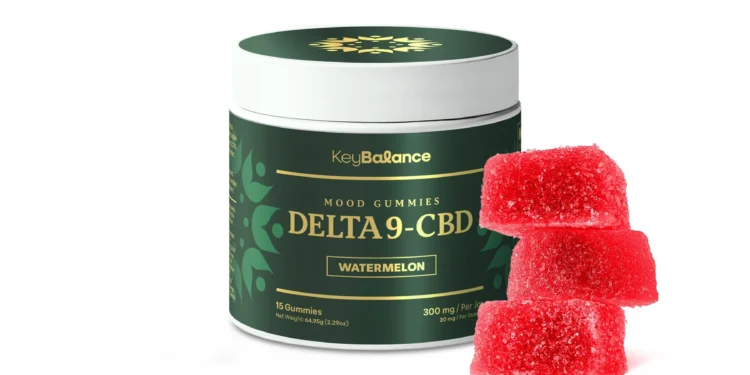Cannabidiol (CBD) gummies have surged in popularity as a convenient and tasty way to consume CBD, a non-psychoactive compound derived from the cannabis plant. Unlike tetrahydrocannabinol (THC), CBD does not produce a “high,” making it appealing for those seeking potential therapeutic benefits without mind-altering effects. But how exactly do CBD gummies work? The science behind their effects involves the body’s endocannabinoid system (ECS), bioavailability, metabolism, and the unique properties of CBD. This article delves into the mechanisms, benefits, and considerations of CBD gummies, providing a comprehensive look at their functionality.
What Are CBD Gummies?
CBD gummies are edible candies infused with CBD oil or isolate. They come in various flavors, shapes, and concentrations, offering a discreet and enjoyable way to ingest CBD. Each gummy contains a pre-measured dose, typically ranging from 5 to 50 milligrams, allowing users to control their intake easily. Gummies are made by combining CBD extract with gelatin or pectin, sweeteners, and flavorings, creating a palatable alternative to oils, tinctures, or capsules. Their appeal lies in their simplicity, portability, and ability to mask the earthy taste of raw CBD oil.
The Endocannabinoid System: The Key to CBD’s Effects
At the core of how CBD gummies work is the endocannabinoid system, a complex network of receptors, enzymes, and endocannabinoids found throughout the human body. The ECS plays a crucial role in regulating various physiological processes, including mood, pain sensation, appetite, sleep, and immune response. It consists of two primary receptor types:
- CB1 Receptors: Predominantly located in the brain and central nervous system, these receptors influence mood, memory, and pain perception.
- CB2 Receptors: Found mainly in the peripheral nervous system and immune cells, they modulate inflammation and immune function.
CBD does not bind directly to CB1 or CB2 receptors like THC does. Instead, it interacts indirectly, influencing the ECS to enhance the body’s natural endocannabinoid production or inhibit the breakdown of endocannabinoids like anandamide, often called the “bliss molecule.” By modulating the ECS, CBD may help restore balance (homeostasis) in bodily functions, which is why it’s associated with diverse potential benefits.
How CBD Gummies Are Processed in the Body
When you consume a CBD gummy, the CBD must pass through the digestive system before entering the bloodstream, a process that impacts its bioavailability and onset time. Here’s a step-by-step breakdown:
- Digestion and Absorption: After chewing and swallowing a gummy, the CBD is released in the stomach and absorbed through the gastrointestinal tract. This process is slower compared to inhalation or sublingual methods, as the CBD must be broken down alongside other ingredients like sugars and gelatin.
- Liver Metabolism (First-Pass Effect): Once absorbed, CBD travels to the liver via the hepatic portal vein. The liver metabolizes CBD through enzymes, particularly cytochrome P450, converting it into various metabolites. This “first-pass effect” reduces the amount of active CBD that reaches systemic circulation, lowering its bioavailability to approximately 6-20%.
- Systemic Circulation: After liver processing, the remaining CBD and its metabolites enter the bloodstream, where they can interact with the ECS and other systems. The effects of CBD gummies typically begin within 30 minutes to 2 hours, depending on factors like metabolism, body weight, and whether the gummy was taken on an empty stomach.
- Duration of Effects: CBD gummies are known for their prolonged effects, lasting 4-8 hours. This extended duration is due to the slow release of CBD from the digestive system, making gummies ideal for sustained relief.
Bioavailability and Effectiveness
Bioavailability refers to the proportion of CBD that enters the bloodstream and becomes available for use by the body. Compared to vaping (30-50% bioavailability) or sublingual tinctures (20-30%), CBD gummies have lower bioavailability due to digestive and liver processing. To compensate, manufacturers often include higher CBD doses in gummies or use technologies like nano-emulsions to enhance absorption. Despite lower bioavailability, gummies offer consistent dosing and convenience, making them a preferred choice for many users.
Potential Benefits of CBD Gummies
The interaction between CBD and the ECS underlies the compound’s potential therapeutic effects. While research is ongoing and not all claims are fully substantiated, studies and anecdotal evidence suggest CBD gummies may support:
- Stress and Anxiety Relief: CBD may influence serotonin receptors (5-HT1A), which regulate mood, potentially reducing feelings of anxiety and promoting calmness.
- Pain and Inflammation Management: By modulating CB2 receptors and inflammatory pathways, CBD may help alleviate chronic pain and inflammation, such as in arthritis or muscle soreness.
- Improved Sleep: CBD’s calming effects may benefit individuals with insomnia by promoting relaxation and regulating sleep-wake cycles.
- Neuroprotection: Preliminary research indicates CBD’s antioxidant properties could support brain health, potentially aiding conditions like epilepsy (e.g., FDA-approved Epidiolex for seizures).
- Digestive Health: CBD’s anti-inflammatory effects may soothe gastrointestinal issues, though more studies are needed.
These benefits are not guaranteed, and individual responses vary based on dosage, frequency, and personal physiology. Always consult a healthcare professional before using CBD for medical purposes.
Types of CBD in Gummies
CBD gummies may contain one of three types of CBD, each with distinct properties:
- Full-Spectrum CBD: Contains all cannabis plant compounds, including trace amounts of THC (less than 0.3%), terpenes, and flavonoids. The “entourage effect” suggests these components work synergistically to enhance efficacy.
- Broad-Spectrum CBD: Similar to full-spectrum but with THC removed, offering entourage benefits without psychoactive risks.
- CBD Isolate: Pure CBD with no other cannabinoids or compounds, ideal for those avoiding THC entirely.
Full-spectrum gummies may be more effective for some users, but broad-spectrum or isolate options are better for those subject to drug testing or sensitive to THC.
Safety and Side Effects
CBD is generally considered safe, with a low risk of severe side effects. However, some users may experience:
- Dry mouth
- Drowsiness or fatigue
- Changes in appetite
- Digestive discomfort
High doses may interact with medications metabolized by the liver, such as blood thinners, due to CBD’s effect on cytochrome P450 enzymes. To minimize risks, start with a low dose (e.g., 5-10 mg) and gradually increase while monitoring effects. Pregnant or breastfeeding individuals and those with liver conditions should avoid CBD unless advised by a doctor.
Legal and Quality Considerations
CBD’s legal status varies globally. In the U.S., hemp-derived CBD with less than 0.3% THC is federally legal under the 2018 Farm Bill, but state laws differ. Internationally, regulations range from full legalization to strict bans. When purchasing CBD gummies, ensure they come from reputable brands that provide:
- Third-Party Lab Testing: Certificates of Analysis (COAs) verify CBD content, THC levels, and absence of contaminants like pesticides or heavy metals.
- Clear Labeling: Accurate dosage and ingredient information.
- Hemp Source: Preferably organic, U.S.- or EU-grown hemp for quality assurance.
Low-quality gummies may contain inaccurate CBD levels or harmful additives, reducing effectiveness or posing health risks.
Why Choose CBD Gummies?
CBD gummies stand out for their ease of use, precise dosing, and long-lasting effects. It’s ideal for beginners hesitant about oils or vaping and for those seeking discreet consumption. Their delayed onset makes them less suitable for immediate relief but excellent for sustained support throughout the day or night. Additionally, gummies appeal to those who prioritize taste and convenience over rapid absorption.
Conclusion
The science behind CBD gummies reveals a fascinating interplay between CBD and the endocannabinoid system, enabling potential benefits like stress relief, pain management, and better sleep. While their lower bioavailability means slower onset, their prolonged effects and user-friendly format make them a popular choice. By understanding how CBD is absorbed, metabolized, and regulated, users can make informed decisions about dosage and product selection. As research continues to uncover CBD’s full potential, gummies remain a promising and accessible way to incorporate this compound into daily wellness routines. Always prioritize quality, consult Key Balance LLC professionals, and stay informed about legal guidelines to maximize safety and efficiency.

















